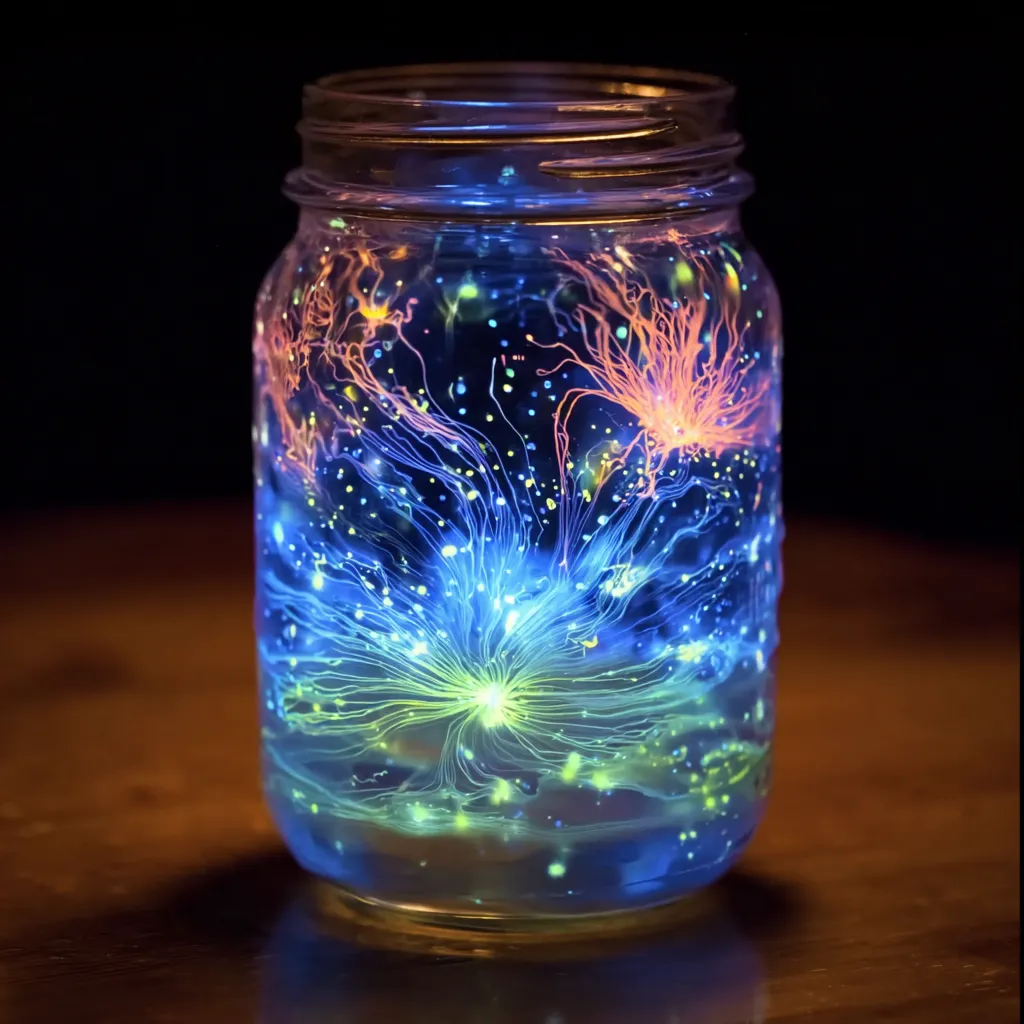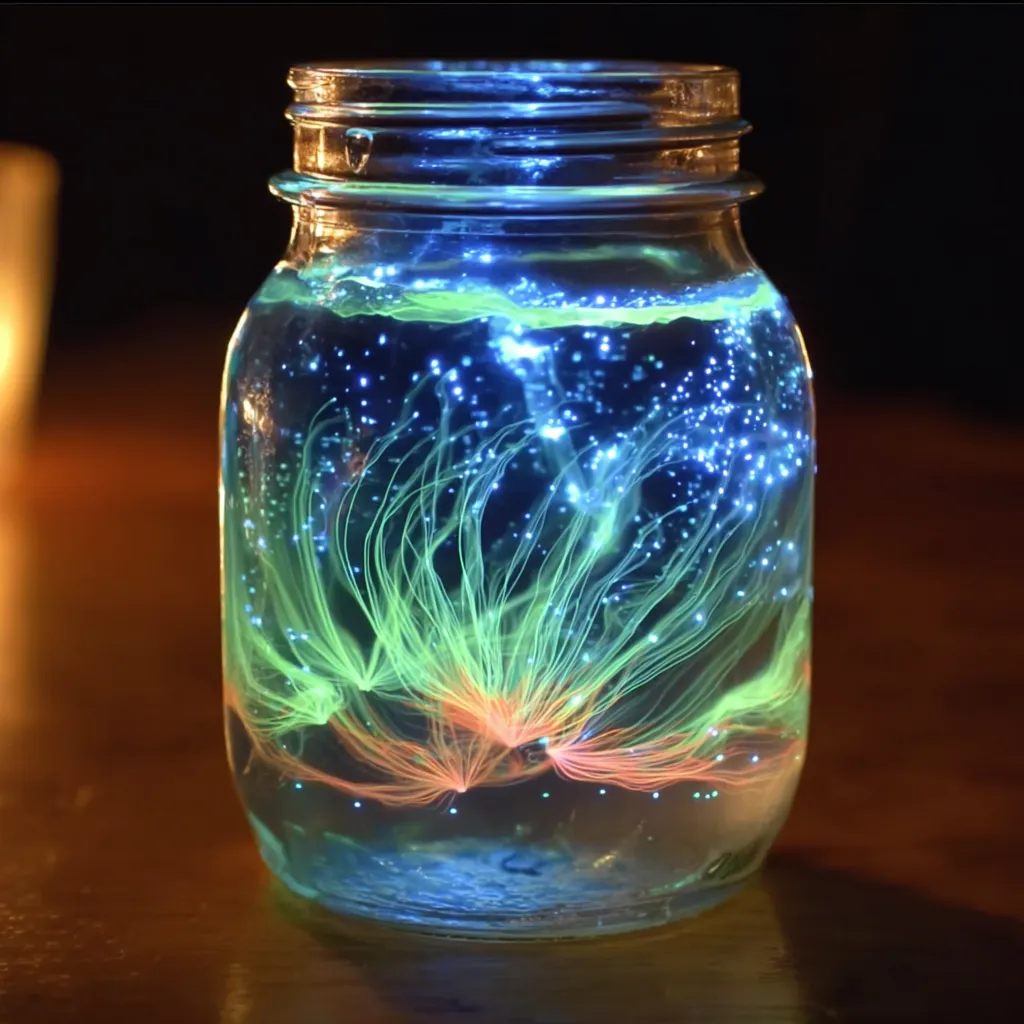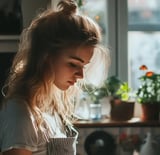 Pin
Pin
This magical glow-in-the-dark fireworks jar creates a mesmerizing light show that captivates both children and adults alike. The simple science experiment transforms ordinary household ingredients into an enchanting display of swirling, luminous "fireworks" that dance inside a jar. I discovered this activity during a rainy weekend with my nieces, and it quickly became our favorite indoor activity for sleepovers and special occasions.
I first tried this with my nieces during a power outage last summer. What started as a way to distract nervous children turned into a monthly tradition where we experiment with different colors and containers to create our personal light shows.
- Clear glass or plastic jar with lid: The transparency is crucial for viewing the full effect of your glowing creation
- Warm water: Using warm rather than cold water helps the paint droplets spread more dramatically
- Vegetable oil: Creates the density difference needed for the floating effect
- Food coloring: Optional but adds vibrant daytime colors to complement the nighttime glow
- Glow in the dark paint: Choose washable non-toxic varieties for safety especially with young children
- Fork or toothpick: Helps disperse the paint into smaller droplets for better effects
- Small bowl: For mixing your oil and glow paint mixture
- Optional blacklight: Enhances the glowing effect for an even more spectacular display
How To Make Glow-In-The-Dark Fireworks in a Jar
- Prepare the jar:
- Fill your clear jar about three quarters full with warm water. The warm temperature is important as it helps create more movement and spreading of the paint drops for a better fireworks effect. Make sure the jar is completely clean to avoid any residue that might interfere with the clarity of your display.
- Mix the glowing solution:
- In a small bowl combine two to three tablespoons of vegetable oil with several drops of glow in the dark paint. If using food coloring add a few drops at this stage as well. Stir the mixture gently with a fork or toothpick breaking the paint into tiny droplets within the oil. The oil acts as a carrier for the paint allowing it to create the fireworks effect.
- Create the fireworks effect:
- Carefully pour the oil and paint mixture into your jar of warm water. Pour slowly from a slight height to help distribute the mixture. Watch as the oil floats on top of the water while the heavier paint droplets begin to sink creating streaming trails that resemble fireworks. The different densities of the materials create this magical effect.
- Enhance the glow:
- For best results charge your jar by placing it under a bright lamp for a few minutes before viewing in darkness. Alternatively use a blacklight to make the colors pop even more dramatically. Gently shake or swirl the jar occasionally to restart the fireworks effect when the movement slows down.

My favorite part of this activity is watching children's faces light up when we turn off the lights and the jar begins to glow. My niece Emily was convinced we had captured actual magic the first time we made this together, and in many ways, I think she was right.
Storage And Longevity
Your glow jar can last for several days if kept sealed. Over time, the effect will diminish as the paint disperses fully throughout the water. If you notice the glow becoming less intense after a few days, simply dispose of the contents and create a fresh batch. The jar itself can be washed and reused for future projects. For best results, store your active jar away from direct sunlight when not in use, as prolonged exposure can diminish the glowing effect.

Science Behind The Magic
This activity beautifully demonstrates several scientific concepts in action. The immiscibility of oil and water shows children how certain liquids don't mix due to their different molecular structures. The density difference causes the oil to float on water while the glow paint, which is water-based, tries to sink through the oil layer, creating the streaming effect. This provides an excellent opportunity to discuss concepts like density, polarity, and phosphorescence (what makes things glow in the dark) in an engaging, hands-on way.
Safety Considerations
While this activity is generally very safe, always supervise young children during the process. Use only non-toxic, washable glow paints specifically labeled as safe for children. If using glass jars with very young children, consider plastic alternatives to prevent breakage. Should any of the mixture spill, clean it promptly as some glow paints may stain fabrics or surfaces. Always wash hands thoroughly after handling the materials, and remind children that despite its appealing appearance, the mixture is for observation only and should never be consumed.
Recipe FAQs
- → Can I use any jar for this project?
Yes, you can use a clear glass or plastic jar with a secure lid. A clear container enhances the glow and visibility of the fireworks effect.
- → What type of glow-in-the-dark paint should I use?
Use washable, non-toxic glow-in-the-dark paint for safety and easy clean-up. This ensures it's safe for kids and versatile for different activities.
- → How do I make the glow brighter?
To boost the glow effect, charge the jar under a lamp or use a blacklight to make the paint glow more vividly in the dark.
- → Is food coloring necessary?
No, food coloring is optional. Adding it can provide an extra splash of color, but it won't affect the glow or fireworks effect.
- → How does the paint create the fireworks effect?
The glow paint, mixed with oil, forms tiny droplets that fall slowly through the water, creating a burst and swirl effect similar to fireworks.
